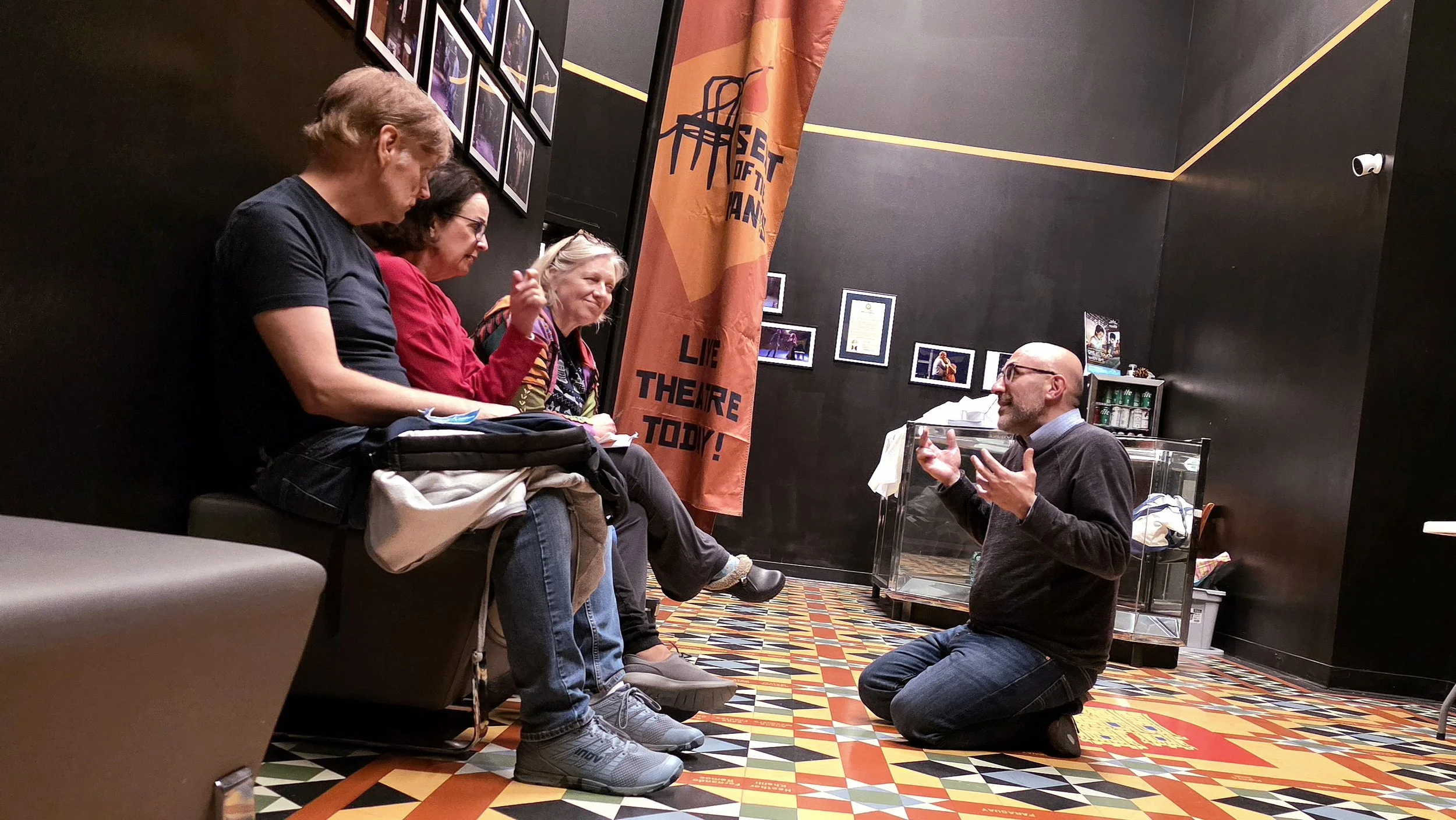SHADOWING THE PROCESS, BY KATHERINE NASH
Hey there! I’m Katherine Nash and I’m brand new to the Ensemble this season. One of the things that enticed me to join the crew is how SotP prioritizes the continued artistic growth of our ensemble members. One of the ways we do this is by offering Growth Opportunities, where ensemble members may shadow other artists and learn about their process. I’ve wanted to dip my toe into directing for a while, and so I chose to shadow Craig Joseph as he directed The Children. I attended numerous rehearsals and production meetings, studied the script, practiced giving notes, participated in discussions with Craig and Lisa L. Wiley (Stage Manager), and more. Here are some of the things I absorbed while observing the process:
Vision. Do yourself a favor and establish your vision. You can change your mind, you can alter the vision based on input from other artists involved, but already having a skeleton for the process helps find the through line, keeps everybody on the same page, and acts as a kind of map when you don’t have an answer. Craig establishes this through a combination of his own work with the script and tablework/rehearsal with the cast and crew. He has several tools he uses for this purpose, but I’ll briefly touch on one:
General Beauty Statement: Craig asks himself a series of questions about the script, the answers to which he types up to share with the cast and crew. He has said before that “If I can’t answer these questions for myself, I wonder if I should be directing this script.” Some of the questions include: “What gives this play BEAUTY?”, “What EXCITES you as an ARTIST?”, and “What MOVES you as a PERSON?” (The difference between the second and third is especially compelling to me.) I wrote my own version of this document for The Children, and Craig offered notes to help me curate my hypothetical production of this play. I was delighted to find that answering these questions for myself totally cemented what my priorities were for this script, which had been just messily floating around in my brain before. (If you haven’t already checked it out, Craig’s final Beauty Statement for The Children is a few blog posts back!)
Generosity. Trust your collaborators. As much as you are able, give them space to play. There is always something you can learn from them. Craig makes it a point in his rehearsals to seek out proposals and differences of interpretation, and makes time to try things that he isn’t sure are right. As an actor myself, it was an absolute delight to watch the performers play during this rehearsal process. Embracing the creativity and insight of your performers develops the flavor of the work in ways that directors simply can’t do by themselves. This also applies to production and design. In The Children, there are several complex sound and lighting elements that Craig, Angie Hayes (Sound Designer), and Micah Harvey (Lighting Designer) discussed and finalized together. Craig would often say something like: “Oh, interesting! Let’s try it, I wanna see it.” If Craig has the time and resources to be flexible, he prioritizes it. But as fun as play is, eventually the work must be finalized, and when that time comes…
Clarity. Not knowing what’s working or what’s expected of you is disorienting. Craig is upfront about his priorities and expectations. Being direct in this way doesn’t mean being unkind, and I think it actually feels incredibly kind not to make people guess what you’re thinking. In the rehearsals and production meetings I attended, there was great benefit to making sure everyone was on the same page. If something really moved him, if it was really effective, Craig said it. If there were things that needed to be fixed, or deadlines that weren’t being met, he said that, too. Knowing his priorities and finding a concise, clear way to articulate himself cut down on confusion, and ensured everyone knew what they’d accomplished and what was still needed of them.
Translation. We are better collaborators when we understand how other artists think about the work. Craig sometimes refers to himself as “The United Nations” of the rehearsal process, saying it’s his responsibility to learn everyone’s “language” and speak to them in it. And I found out very quickly that this is harder than I thought. Apparently, acting experience =/= directing experience. Shocking, right? Of course there’s so much about directing that I don’t know… but as an actor, I’ve been on the receiving end of notes so many times, I really thought that at least the note-giving part of the job would be easy for me! But I actually found it very difficult to translate my thoughts into coherent notes. (Thank you so much to all the actors in The Children, who were very patient as I tried.) I once tried to express “I think this particular line is very important, maybe try hitting it a little harder?” Which is not very specific, and certainly not in the actor’s “language.” Craig was able to translate that into “Try offering this line as a gift to your scene partner.” This note was not only specific and evocative, but also in a “language” that he knew made sense to that particular actor. It was an excellent translation that resulted in a really beautiful moment on stage.
I’m hoping to carry these learnings into my future directing work. And you will have the opportunity to see it when I direct our Salon Series reading of Forget About Me, by David Hansen, at the end of the season! Come check it out on June 13th, 2026!

